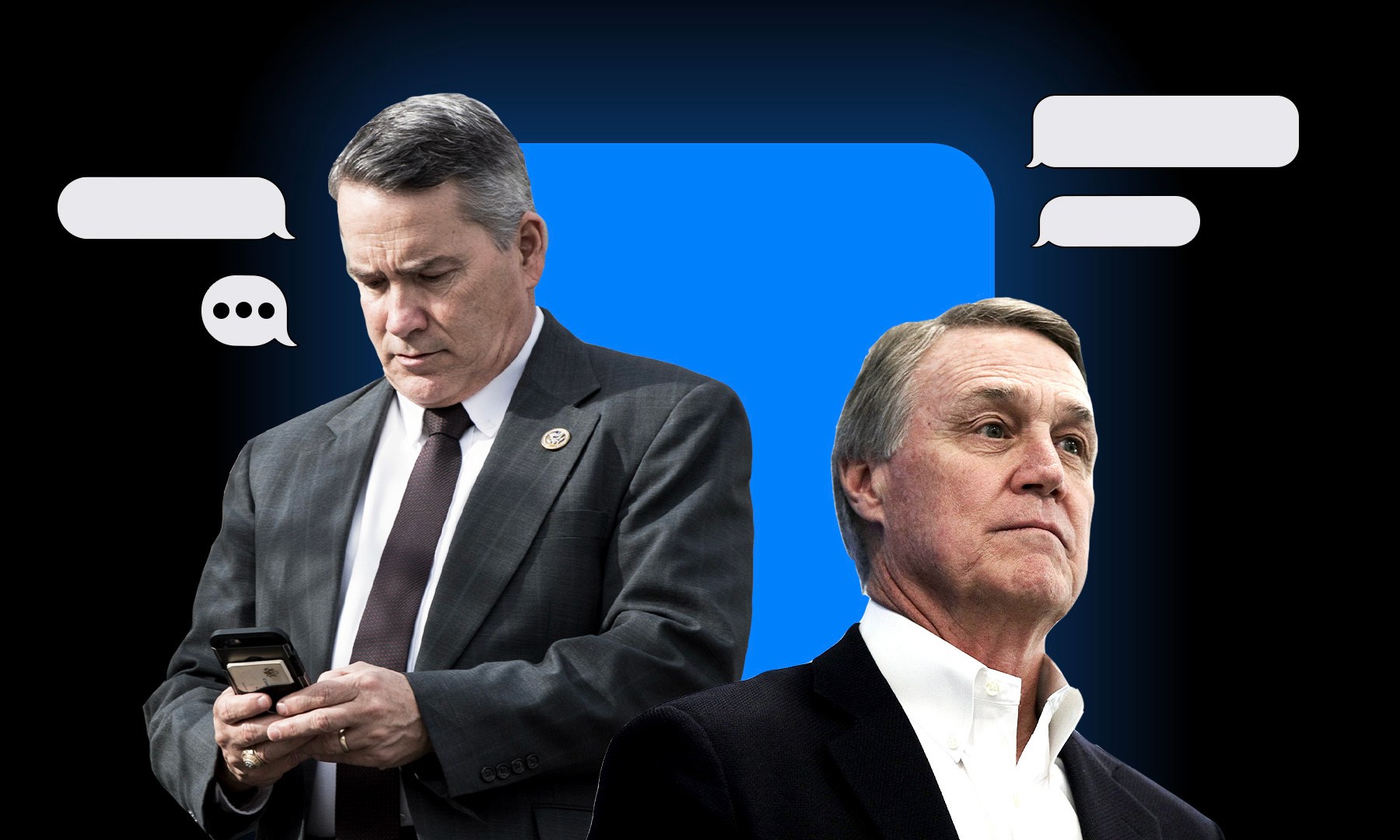It was Nov. 5, 2020. Votes were still being counted in the presidential race, but it was looking increasingly grim for President Donald Trump. Mark Meadows, Trump’s White House chief of staff, had an idea to turn things around.
Dick Morris, the former Bill Clinton strategist-turned-conservative pundit, had appeared on the far-right cable channel Newsmax that morning touting a plan to have Republican state legislatures “take over the counting process” in key states. Rep. Mark Green (R-TN), one of 34 members of Congress who messaged Meadows about overturning the vote, had sent Meadows a text highlighting Morris’ strategy. That evening, Meadows wrote Georgia state Sen. Marty Harbin and urged him to contact Morris to put the wheels in motion.
“The state legislature can take over the electoral process. Could you call Dick Morris … so he can explain how the problem could be solved by State legislators,” Meadows wrote.
The text was one of 2,319 that Meadows turned over to the House select committee investigating the Jan. 6 attack. TPM has obtained the text log and it shows how Georgia, a crucial swing state, was a major focus of Trump’s effort to reverse his loss. The committee and Meadows did not respond to multiple requests for comment. For more information about the story behind the text log and our procedures for publishing the texts, read the introduction to this series.
The messages, the majority of which are being published here for the first time, reveal in new detail how the Georgia push collided with Senate runoff campaigns, which took place simultaneously in the state. David Perdue and Kelly Loeffler, the state’s two Republican senators, were fighting to keep their seats at the same time Trump was working to reverse his loss. The runoff elections were on Jan. 5, 2021. Trump’s official reckoning — the presidential electoral certification — was the day after. That confluence left Georgia’s Republican senators seemingly struggling to maintain Trump’s favor by proving their devotion to his attempts to stay in power.
During the first few days after the election, ideas about how to manipulate the results in Georgia poured into Meadows’ phone. On Nov. 5, the same day Meadows reached out to Harbin, Donald Trump Jr., the president’s son, sent a message about using state legislatures to reject the certification of the results. Don Jr.’s text was the first one in the logs to explicitly mention Jan. 6, 2021, the date when the Electoral College vote would be certified on Capitol Hill.
Meadows responded to the message the following day. He suggested the White House was pursuing some version of the Don Jr. plan in Georgia.
“Much of this had merit. Working on this for pa, ga and nc already,” he wrote. Don Jr.’s message, and Meadows’ reply, was first reported in “The Breach: The Untold Story of the Investigation Into January 6.” Don Jr. did not respond to a request for comment.
Matt Schlapp, a veteran conservative activist with close ties to Trump, also wrote Meadows on Nov. 5. Schlapp suggested there was “a bunch of bs going on” and that Meadows should “move fast” and pursue an “injunction” to halt the vote count.
“Ok,” Meadows replied.
Schlapp did not respond to a request for comment.
Officials at every level of government, including multiple Republicans and members of the Trump administration, have confirmed there was no widespread fraud in the 2020 presidential election. Georgia’s result was checked twice in recounts overseen by a Republican secretary of state, Brad Raffensperger.
But Meadows’ phone was flooded with paranoid theories from an alternate universe where fraud ran rampant and Trump allies had to fight desperately to stop the votes from being counted. Another person, whose name we are withholding as they do not appear to be a public figure, sent Meadows another message calling for an “injunction” on Nov. 5. They emphasized the importance of Georgia’s vote.
“Biden takes GA and AZ and PA are irrelevant in getting to 270,” the person wrote to Meadows, adding, “A nationwide injunction must be issued here to stop the counting of all ballots. As soon as Biden goes ahead in GA you can’t put that toothpaste back in the tube.”
The logs, which do not appear to be a complete record of Meadows’ communications, do not include a reply to that message. By Nov. 6, Harbin sent a concerned text. He indicated Republican lawmakers in Georgia were being directed to stop fighting and making fraud claims.
“Our Senate leadership has told us that they have been asked to stand down by the Trump team on calling a special session to address the voter fraud issues. Is this true?” Harbin asked. “They will not tell us who on the Trump Team wants us to hold back. We feel it is important to act.”
“No one should be asking you to stand down,” Meadows replied to Harbin the following day.
Over the next few weeks, Harbin kept Meadows posted on Georgia legislators’ efforts to challenge the election result in their state. Harbin did not respond to a request for comment.
Other allies also sent Meadows advice or apprised him of their own efforts. Don Jr. traveled to Georgia and Meadows connected him with Cleta Mitchell, a right-wing lawyer who was working with the Trump campaign on election challenges. In a statement to TPM, Mitchell defended her legal work in the state. “I was part of a legal team that filed an election contest pursuant to Georgia state law in which we identified through government records that there were more illegal votes cast in violation of Georgia’s election code than the margin between President Trump and Joe Biden,” Mitchell said.
Multiple members of Congress sent Meadows updates, including Rep. Jody Hice (R-GA). In one Dec. 19, 2020 message to Meadows, Hice claimed to be “leading the GA electoral college objection on Jan 6.” Sarah Selip, a spokesperson for Hice, told TPM that he “did lead the electoral objection for Georgia.”
“I mean that’s just how it is,” Selip added.
Tensions were high because the presidential race wasn’t the only political battle in the state. By Nov. 13, 2020, it was clear that both of Georgia’s incumbent Republican senators — Perdue and Loeffler — were facing runoff elections against their Democratic Party rivals, Raphael Warnock and Jon Ossoff. On Nov. 16, Fox News host Sean Hannity (whose correspondence with Meadows was first reported by CNN and the select committee) sent along an article from a conservative news site that involved the movie “The Godfather” and advocated for challenging absentee ballots.
On Nov. 19, Raffensperger announced that the hand audit of ballots was complete and there was “no doubt” Biden defeated Trump in Georgia. White House Deputy Chief of Staff for Communications Dan Scavino sent Meadows the news.
“Pathetic,” Meadows replied.
Scavino did not return TPM’s request for comment.
In the final days of November 2020, even as it became clear that Biden had won the state — and the election — Meadows continued to receive support for challenging the results from Trump allies in Congress. Sen. Kevin Cramer (R-ND) passed along what he seemed to indicate in the text was a proposal from Drew Wrigley, a U.S. attorney in his state who would go on to become its attorney general, to use a request to audit absentee and mail-in ballots in a maneuver that, he claimed, could open the door to allowing Republican legislatures to determine the election result in Georgia and other key states. Wrigley’s office did not return TPM’s request for comment. Cramer, who was not among the Republicans who objected to the electoral certification on Jan. 6, told TPM his messages were “proper” and simply efforts to “be helpful.”
“None of the text messages from me are condemning in any way other than to just try to get all the information again, be as helpful as you can,” Cramer said.
As November 2020 drew to a close, Reps. Brian Babin (R-TX) and Barry Loudermilk (R-GA) both wrote Meadows to tell him about their appearances at rallies in the state.
“That is great. Thanks Barry,” Meadows wrote.
Rep. Rick Allen (R-GA) also began sending Meadows wild conspiracy theories and questionable claims from an alleged high-level “source” on Nov. 25, 2020. That same week, Rick Perry, the former governor of Texas who had been Trump’s secretary of energy, encouraged Meadows to speak to a man involved with a website that allowed social media users to become “vote detectives” and investigate ballots. Perry seemed convinced this would blow the whole “voter fraud” thing wide open.
“This changes the dynamic,” Perry wrote, adding: “This is for all the marbles. The biggest most respected data guy in GA went through this new platform finished Sunday and said WOW.”
Meadows apparently gave Perry’s contact a call.
In a phone call with TPM on Tuesday, Perry claimed that he had previously called Verizon and found that the texts committee investigators identified as coming from him in the log provided by Meadows were fake.
“I had no recollection of those as a matter of fact,” Perry told TPM. “I called Verizon and asked them to go back and look at my text messages and they could not confirm those either.”
When TPM began to read the texts to Perry on the phone, he said “you can read anything that you want that’s made up, I don’t consider that to be anything other than hearsay or a potentially felonious statement that somebody else has put in the record.”
As the weeks passed, Trump’s allies in Congress were focused on objecting to the electoral certification on Jan. 6, 2021. According to Hice, the newly elected Rep. Marjorie Taylor Greene (R-GA), who was officially sworn in three days before the certification, was coordinating directly with Trump. He also suggested the right-wing House Freedom Caucus was a core part of the effort. Hice was confident Allen, Rep. Andy Biggs (R-AZ), an avowed election conspiracist, and Rep. Mo Brooks (R-AL), another leading objector, would also stand with them.
Meadows replied to Hice, asking who would come to a Dec. 21 meeting at the White House held to plan objections for Jan. 6, 2021.
On Dec. 23, 2020, two days after congressional election objectors met at the White House to have a planning meeting for Jan. 6, Meadows made a “surprise visit” to observe Georgia’s audit of absentee ballot envelope signatures in Cobb County. While there, Meadows reportedly met with Raffensperger’s deputy, Jordan Fuchs. Based on the text log, the pair began exchanging messages on the day of their meeting, with Fuchs answering questions from Meadows about Georgia’s vote count.
That same evening, Meadows got some bad news. Phil Waldron, a former Army colonel who worked with top Trump allies on plans to overturn the election, texted Meadows an update from Arizona.
Waldron’s message appeared to be a reference to a case filed by an Arizona lawmaker who was tied to the failed “Cyber Ninjas” audit of the vote in that state. The suit was dismissed by a judge that day. Waldron suggested the Arizona suit was a pivotal part of the Trump team’s strategy and said they would now have to set sights on Georgia.
Waldron did not respond to a request for comment from TPM.
Six days later, Harbin, the Georgia state senator, began texting Meadows links related to the conspiracy theory that became known as “ItalyGate,” which focused on the idea that Italian defense contractors somehow used satellites to alter the election results.
“Mark, If this is true it would be a game changer for Georgia,” Harbin said, adding, “We need to act quickly. God’s wisdom my friend.”
“I will check it out,” Meadows replied.
As the ideas in Meadows’ inbox became more far-fetched, David Perdue, one of the Republican senators who was facing a runoff race, helped the White House chief of staff arrange a call. Based on the texts, Perdue linked leaders of the Georgia legislature and Rudy Giuliani, Trump’s personal attorney who aided the former president’s campaign in a divisive effort to challenge the election results. Meadows was evidently pleased with Perdue.
“Great,” Meadows replied in the Dec. 29 exchange.
Perdue declined to comment to TPM.
On Jan. 2, 2021, the texts show Meadows worked with Fuchs to set up another call, a conversation with Trump and Raffensperger, the Georgia secretary of state.
The chief of staff had, in November, texted Raffensperger twice, with no response. Meadows’ texts to Raffensperger, like some others in the log, appeared to come from an email account associated with the chief of staff. Raffensperger’s office told TPM that he “thought it was odd that a Chief of Staff to a President would contact him through a Gmail account” and that, at the time, nobody “was sure that it was actually Mark Meadows reaching out.”
But by Jan. 2, Meadows had established direct contact with Raffensperger’s office via Fuchs.
That phone call would become one of the more infamous moments in Trump’s push to reverse his defeat when the Washington Post obtained a recording of the conversation and published it on Jan. 3. In the recording, Trump pressed Raffensperger and his aides to “find 11,780 votes, which is one more than we have.”
“So what are we going to do here, folks? I only need 11,000 votes. Fellas, I need 11,000 votes. Give me a break,” Trump declared.
Raffensperger debunked various conspiracies that Trump aired on the call and told the former president, the “data you have is wrong.” He repeatedly rejected Trump’s requests to change the results.
“We have to stand by our numbers. We believe our numbers are right,” Raffensperger said.
Along with showing Meadows and Fuchs arranging the conversation, the text logs show what was happening in real time behind the scenes as the phone call broke down. Based on the messages, Fuchs pleaded with Meadows to get Trump to hang up.
Just over an hour later, Perdue texted Meadows to ask for a favor. He needed Trump, who was coming to Georgia for a campaign rally on Jan. 4, to tape a robocall for the Senate runoff candidates.
The next day, with the rally and the runoff approaching, Trump campaign adviser Jason Miller sent Meadows a text just after 3 a.m. to warn about a potential problem. According to Miller, Trump wanted the two Georgia senators — Perdue and Loeffler — ”to get on board with the Cruz effort.” That was seemingly a reference to a move spearheaded by Sen. Ted Cruz (R-TX) to have senators object to the election results. Cruz had texted Meadows about the plan. Based on his conversations with their campaign teams, Miller feared Perdue and Loeffler were not “willing to join the effort.”
“My concern is that Perdue and Loeffler not being on board with the Cruz effort could become a big rally issue on Monday, and it might be worth your personally prodding both Senators on Sunday to get ahead of it,” Miller wrote.
That afternoon, Trump’s team had another issue on its hands. The Washington Post story about the Raffensperger call was out. A few hours later, Perdue was texting Meadows with concerns that Trump might cancel the campaign rally.
“Sorry to bother you but just heard WH counsel may be asking Trump to cancel tomorrow. That would be a disaster here. Can you call me? Thanks,” Perdue wrote.
A few hours later, Perdue seemed to realize there was another potential problem with the event. Perdue seemingly attempted to address the concerns raised by Miller and passed along coverage highlighting his support for the electoral objection. The senator expressed concern Trump would be unaware he was objecting to the electoral certification.
“Thanks for all your help.” Perdue wrote Meadows. “Below is one of many stories today about my objecting to GA electors. The President didn’t seem to know that I first called for that three weeks ago. He even tweeted about it then but probably forgot. Thanks.”
The rally in Georgia took place as scheduled on Jan. 4. That evening Rep. Fred Keller (R-PA) wrote Meadows with an idea to spin the drama in Georgia. Keller, who did not respond to a request for comment from TPM, suggested that Trump could claim that his comments on the Raffensperger call were simply a ruse designed to see whether the secretary of state’s office would leak. Then Trump could argue that because it was released to the press, it proved Raffensperger had fallen for his trap and could not be trusted.
Meadows apparently liked Keller’s convoluted plot to spin the call.
“Love it,” he replied.
Update: This article has been updated to include a statement from Cleta Mitchell.













Getting tired of this old Meadows stuff. Who did MM work for again? Remind me…
Just outstanding reporting, folks. It can’t be said enough that this Republican Party is a bunch of unbridled and unmitigated gullibility, stupidity, larceny, and greed.
Considering his, Gabe Sterling and Kemp’s history with Abrams, there was a small possibility that Raffensperger possibly loses this year. However, he was seen as a hero, soooooooo…
He worked for the Republican Party branch of The Trump Organization.